If you take away one lesson from this blog, I hope it’s that being healthy has as much to do with mental health as it does with the foods we eat and the exercises we complete.
I’ll admit – I’m a textbook perfectionist and workaholic. I always have been, and I’m pretty sure that I always will be. These personalities quirks usually serve me quite well, allowing me to professionally burn the metaphorical midnight oil in ways most sane people would balk at. But, of course, my perfectionism is occasionally my own worst enemy.
A year and a half ago, I was standing in the bathroom at a community college, staring blankly into the mirror. I felt overwhelmed and insecure. My plans for a career change weren’t going as smoothly as I had hoped, and the 70-hour work weeks were taking a toll. “You are stupid,†I thought. “You are worthless. You are totally going to bomb that test. You’re never going to get into that doctorate program.* You’re never going to succeed. You’re going to be stuck in this job forever.†Just as quickly as all of those terrible thoughts raced through my head, a more positive idea emerged: I took a sheet of paper out of my bag, scribbled “You are beautiful†on the note, and stuck it to the mirror.
And in that moment, Operation Beautiful was born.
Whenever I discuss the concept of “Fat Talk†during Operation Beautiful presentations, I am always quick to point out that “Fat Talk†is not just limited to how you feel about your body. Fat Talk can also be negative self-talk about your abilities, future, personality, professional life, and more.
If you think Fat Talk is just words, think again. Negative self-talk has a real impact on the way you see yourself, which ultimately impacts your overall happiness and confidence. Fat Talk can hold you back professionally, personally, spiritually, and emotionally. There’s not a single redeeming benefit to beating yourself up constantly.
A recent study by Glamour magazine revealed this startling fact:
Now, I would be totally lying if I told you that I never have negative thoughts about my body or abilities. Yes – the editor of Operation Beautiful struggles with Fat Talk from time to time – I’m not superhuman! :) Unfortunately, in our society, I think it’s very difficult to fully eliminate negative self-talk, even if we are satisfied with who we are and what we look like.
Part of the problem is that our society sets forth one ideal of feminine (and masculine) beauty. Woman are expected to be painfully thin, with no lumps, bumps, pimples… or even pores. We call this the Thin Ideal.
Men are expected to be tall and tan, with broad shoulders, six-pack abs, and a full head of hair. This is often referred to as the Muscular Ideal.
The problem with these ideals, especially the Thin Ideal, is that they are often unhealthy or achieved via unhealthy ways. Did you know 70% of actresses on television are underweight? Not only are the celebrities and models glorified in movies, TV, and in magazines unhealthily thin, but they are Photoshopped to an even more unrealistic and unhealthy ideal of thinness. It’s a double whammy that is doing serious damage to our society’s concept of beauty and health.
This week is National Eating Disorder Awareness Week, and although I’ve blogged about it every day on Operation Beautiful, I haven’t had a chance to discuss it on HTP until now. One thing that I believe we can all take away from NEDA Week – regardless of whether or not we have struggled with an eating disorder (I never have) – is that we alone are responsible for the dialogue in our own heads. The media, our parents, our friends, bullies, and other outside sources can plant negative thoughts in our brain, but it’s up to us whether we choose to listen to these ideas or weed them out.
Although it’s hard to escape from the Thin Ideal and Muscular Ideal messaging and fully eliminate Fat Talk, I do believe it’s possible to greatly minimize and manage Fat Talk in a way that is healthy and positive.
Here are some simple tips for squashing Fat Talk and getting on the positivity train (wanna know more? Check out my first book!):
- You must recognize that you’re doing it! The first step is consciously acknowledging that you Fat Talked. If I Fat Talk in my own head, I correct myself internally, but if I Fat Talk out loud, I try to correct myself in conversation because I don’t want my friend/Husband/parent to be impacted by my Fat Talk. I’ll say, “I don’t even know why I said that, I know I’m smart/capable/beautiful/healthy.â€
- Replace your negative thoughts with something positive BUT realistic. Studies show that people who are struggling with particularly low self-esteem have trouble accepting grand statements such as, “I am the most awesome person, ever.†So replace your Fat Talk with something positive and believable – and if you’re Fat Talking about your looks, add a positive statement about your personality. For example, if you catch yourself thinking, “I look like a fat cow in this shirt,†think, “That is ridiculous. This shirt just isn’t flattering. I love my arms and this top doesn’t do my guns justice. Plus, who cares? I’m going to rock this presentation regardless because I always do well with public speaking.â€
- Become Media Aware. I think it’s extremely important to educate yourself on how much Photoshopping is done in the media. I also love to critically look at advertisements and think about what values they are trying to sell me on (beyond “buy this productâ€). Marketers try to sell us concepts of beauty, sex, morality, parenthood, childhood, and more. I think a great pro-feminism website that everyone (man and woman) should read is Jezebel. I also enjoy the website The Illusionists (the archives are great; particularly this post).
- Write it down. Write down a list of your positive characteristics and why you want to eliminate negative self-talk. Tape it to your mirror and re-read as often as necessary. It seems corny, but it totally works.
- Surround Yourself with Positive Influences. Friends, family, and the media have a huge impact on how we talk to ourselves. If there’s a toxic person in your life, please consider cutting them out or talking to a therapist to learn how to deal with them in a way that doesn’t negatively impact your own self-esteem. Don’t read magazines or blogs that make you feel worse about yourself. There is so much positive inspiration out there!
- Post an Operation Beautiful Note. Although I could’ve never guessed it at the time, posting that first note in the public bathroom ignited a world-wide revolution of self-esteem and positivity. I’ve received 7,000+ notes in dozens of languages and from every continent – even Antarctica! Operation Beautiful WORKS, and the reason why is that it’s so simple. Writing a positive message for a stranger really helps YOU gain confidence and encourages positive self-talk. If you post a note, take a picture and email it to me at operationbeautiful@gmail.com. Every notes goes on the site!
* Side note: I did, in fact, get into that doctorate program (I wanted to become a physical therapist). But by the time I had gained entry, Operation Beautiful and HTP had taken off in a way I could’ve never predicted! And here I am today. Lesson learned: Do what you gotta do to succeed, but trust that you’ll end up on the path you’re destined for.
How are you celebrating NEDA Week? How do you stop negative self-talk? Do you have any positive tips, mantras, or visualizations to share?

![CIMG6166_thumb[1] CIMG6166_thumb[1]](http://www.healthytippingpoint.com/wp-content/uploads/2011/02/CIMG6166_thumb1_thumb.jpg?x40757)
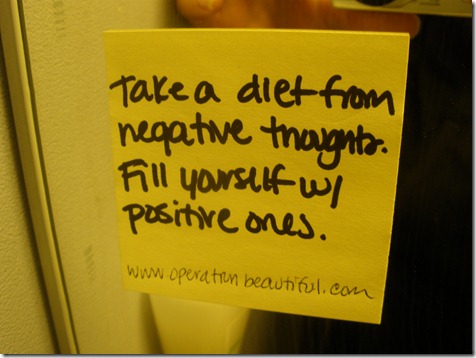

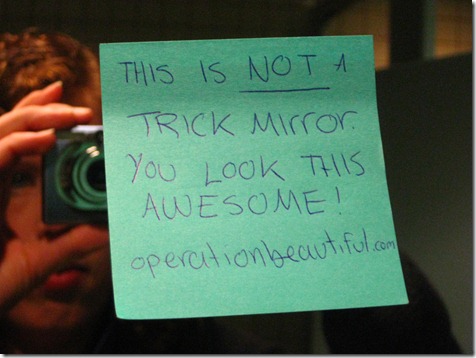
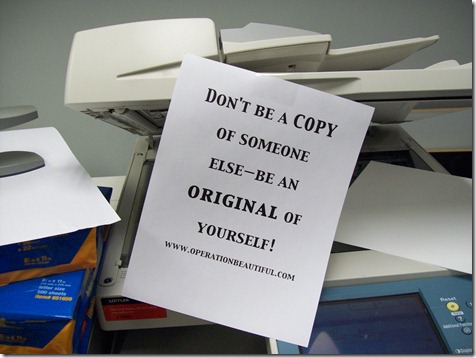
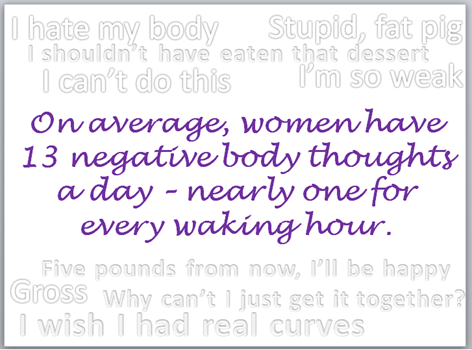


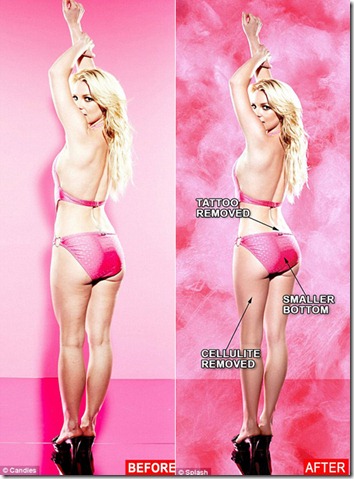
You know your blog has actually been really instrumental for me to stop the negative self talk. You had said in a post long ago to just replace the thoughts with positive ones, and while such a simple concept, I just never thought to do that before. Now I make a conscious decision to stop myself from thinking those thoughts as SOON as it starts.
This applies to other areas. I’m naturally a really impatient person and get really worked up in traffic jams or in lines at the bank. Instead of letting myself freak out, I realize I have no control over the situation and just tell my brain to stop stressing because it’s not productive. Instead, I’ll think about what to have for dinner or what to do that night, or just anything more productive than allowing myself to get stressed about something that’s completely out of my control.